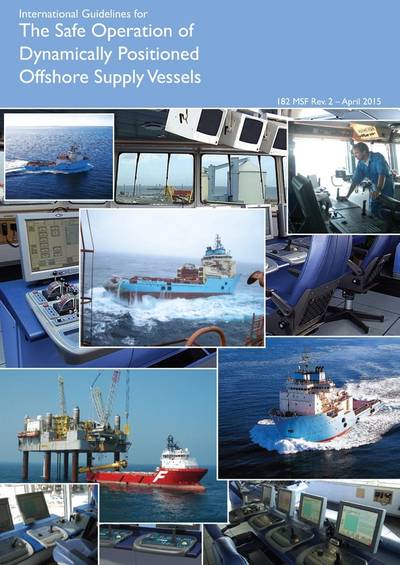IMCA Publishes Guidelines for DP OSV Safe Operations
Reliable and robust methods of positioning are required for safe vessel operations in close proximity to offshore installations. Dynamic positioning (DP) is well-established as a primary method of vessel positioning in the diving, drilling, construction, accommodation and shuttle tanker sectors, and is especially suited to deep-water developments. As development and management of DP becomes more refined, increasingly logistics support vessels are becoming equipped with DP systems with increasing reliance being given to such systems.
With this increased use in mind, the International Marine Contractors Association (IMCA) has published an updated edition of ‘International Guidelines for the Safe Operation of DP Offshore Supply Vessels’.
“The guidelines were originally drawn up by an international cross-industry workgroup, and have recently been updated by the Marine Safety Forum in conjunction with IMCA and the Guidelines for Offshore Marine Operations (GOMO) Group,” explains IMCA’s Technical Director, Jane Bugler. “Therefore this document is published by IMCA but with an MSF reference (182 MSF). It is freely available for downloading from the IMCA website by members and non-members alike.
“The purpose of these guidelines is to make risk management tools available to vessel operators, charters, masters and officers that will help ensure safe operation of DP offshore supply vessels in automatic DP mode.”
The 48-page guidelines fit into an existing framework of rules and guidance issued by various authorities and organizations. Efforts have been made to ensure compatibility with the existing documents wherever possible.
Jane Bugler adds: “It is recognized that both the DP and offshore supply vessel sectors are constantly evolving. Consequently, these guidelines are only fully relevant to the circumstances in which they were prepared and will have to be updated at least within a three-year cycle to incorporate such changes. We would like to thank all who have contributed to this important document.”
What’s contained in the guidance?
The introduction section of the Guidelines looks at the basis for their production; their application; purpose and scope; and contains useful abbreviations and terms and definitions.
Four other sections follow devoted to ‘Existing Rules and Guidance’; ‘Managing Risk in DP Operations – Competence’; ‘Managing Risk in DP Operations – Operations’; and ‘Managing Risk in DP Operations – Practical Applications’. The appendix contains a wealth of information on relevant publications; DP FMEA and annual trials; annual DP trials; DP capability plot; DP footprint plot; DP vessel specific location checks document; sample DP watchkeeping handover checklist; DP incident reporting; and examples of both critical activity mode of operation (CAMO) and activity specific operating guideline (ASOG).













